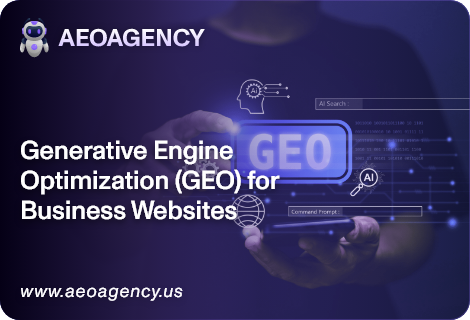The way people search online is changing fast. Instead of only typing short keywords into Google, users now ask full questions and expect direct answers from AI systems like ChatGPT, Google Gemini, Perplexity, Claude, and Microsoft Copilot. These tools don’t just show links—they generate answers.
That shift is exactly why Generative Engine Optimization (GEO) matters.
If you want your business website to appear inside AI‑generated answers, summaries, and conversational results, traditional SEO alone is no longer enough. GEO helps ensure your content is understood, trusted, and cited by modern AI engines.
This updated guide explains what GEO is, how it differs from SEO, and how U.S. businesses can build visibility across AI search platforms through 2026—without keyword stuffing or hype.
This guide is created by AEO Agency USA, an agency focused on AI SEO, GEO, and ranking services for platforms like ChatGPT, Gemini, Perplexity, and Claude.
What Is Generative Engine Optimization (GEO)?
Generative Engine Optimization (GEO) is the practice of optimizing your website so AI systems can clearly understand, trust, and use your content when generating answers.
AI engines don’t rank pages the same way classic search engines do. Instead, they:
- Read content for meaning and clarity
- Compare multiple sources
- Pull short explanations, lists, and summaries
- Prefer well‑structured, up‑to‑date, and authoritative pages
For example, when someone asks Perplexity or ChatGPT a question about AI SEO services or the best AEO agency in the USA, the system scans trusted sources and generates a response—sometimes citing the source directly.
GEO focuses on making sure your site becomes one of those trusted sources.
Learn more about this shift in our guide on how to rank in AI search results.
GEO vs. Traditional SEO
Traditional SEO is still important, but GEO adds another layer.
| Traditional SEO | Generative Engine Optimization |
|---|---|
| Targets keyword rankings | Targets AI‑generated answers |
| Focuses on links and metadata | Focuses on clarity and context |
| Optimizes for blue links | Optimizes for citations and summaries |
| Measures clicks and impressions | Measures visibility across AI engines |
GEO doesn’t replace SEO — it builds on it. Businesses that combine both approaches are better positioned for modern search.
Why GEO Matters for Businesses in 2026 and Beyond
Today, users often get answers without clicking ten links. AI summaries appear at the top of search results or inside tools like Gemini and Perplexity.
If your content isn’t included in those answers, you lose visibility—even if your site ranks well in classic search.
Benefits of GEO for Business Websites
- Visibility inside AI answers and summaries
- Higher trust when your brand is cited by AI tools
- Better reach for conversational and voice searches
- More qualified traffic from high‑intent queries
This applies whether you run a local service business, SaaS company, e-commerce store, or marketing agency.
How to Optimize a Website for Generative Search
1. Write for Clarity, Not Just Keywords
AI engines prioritize content that answers questions clearly.
Instead of forcing keywords, explain topics naturally. For example:
Rather than repeating “best AEO agency,” write:
“If you’re looking for a reliable AEO agency in the USA, here’s what to consider when choosing one.”
This approach helps with queries like “best AEO agency,” “AEO agency USA,” and “AEO agency in USA” without sounding forced.
Explore our full AEO services to see how this works in practice.
2. Use Conversational and Question‑Based Content
People interact with AI using natural language. Your content should reflect that.
Include questions such as
- What is AI SEO?
- How does ChatGPT ranking work?
- Does Perplexity use SEO signals?
This supports searches related to AI SEO, ChatGPT SEO, Perplexity SEO, Gemini SEO, and Claude SEO.
You can see examples in our guide to AI SEO for business owners.
3. Structure Content So AI Can Extract Answers
AI systems prefer content that is easy to scan.
Use:
- Short paragraphs
- Bullet points
- Clear headings
- Simple explanations
Adding FAQ sections improves visibility for AI‑generated summaries and voice responses.
4. Build Authority With Helpful, Updated Content
AI engines rely on trust signals. To strengthen them:
- Keep content updated
- Use accurate, verifiable information.
- Link related pages internally
- Maintain consistent expertise across topics
Our resources on AI SEO service strategies and AI tracking tools explain this in detail.
5. Optimize for AI Ranking Platforms
Modern GEO includes visibility across:
- ChatGPT
- Google Gemini
- Perplexity
- Claude
At AEO Agency USA, we offer dedicated AI ranking services tailored to each platform:
- ChatGPT ranking services
- Gemini ranking services
- Perplexity ranking services
- Claude ranking services
These services align content with how each engine selects and cites sources.
6. Track Visibility Beyond Google Rankings
Classic rank tracking doesn’t show how often your brand appears inside AI answers.
That’s why businesses now monitor:
- Brand mentions in AI tools
- Citations in Perplexity answers
- Visibility in Gemini summaries
Our Perplexity rank tracking guide explains how this works.
GEO and SEO Work Best Together
GEO and SEO aren’t competing strategies.
SEO builds your foundation. GEO ensures that the foundation is used by AI engines.
Together, they help businesses:
- Rank in classic search
- Appear in AI‑generated answers
- Stay visible as search continues to evolve
Prepare Your Website for AI Search
Generative Engine Optimization is no longer optional. As AI tools influence how people discover businesses, GEO helps your site stay visible, credible, and competitive.
By combining SEO, AI SEO, and platform‑specific ranking services, businesses can reach users across Google, ChatGPT, Gemini, Perplexity, and Claude.
If you’re ready to future-proof your visibility, explore our Generative Engine Optimization services or contact AEO Agency USA to discuss a strategy tailored to your goals.
We help U.S. businesses grow through clear, ethical, and effective AI‑driven optimization.

